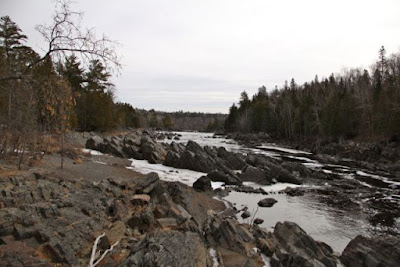Although we're pleased that the Minnesota Pollution Control Agency (MPCA) is working to improve the scientific validity of its sulfate formula to protect wild rice, we are reminded of some concerns expressed in My Minnesota when MPCA proposed a site specific approach to water quality standards. Let's take a moment to elaborate on the situation:
 |
| St. Louis River, Jay Cooke State Park
Photo by J. Harrington
|
- MPCA "has put most of the agency’s mining permitting work 'on pause' to concentrate on the sulfate standard review." [AGATE, 8/7/16] This suggests resource constraints that could well hinder site specific water quality standards setting. Will Minnesota's legislature fund the positions needed if the new and improved sulfate standard is adopted?
- MPCA already has a notable backlog of taconite mining related discharge permits that need to be updated or rewritten. How many more years will go by while standards for each site are set to enable mining permits to be updated?
- The Clean Water Act amendments became law in 1972. MPCA is still working on setting water quality standards with Total Maximum Daily Loads for most of Minnesota's waters.
PLEASE NOTE: through the rest of this month, you can comment on MPCA's latest update to Minnesota's impaired waters list. Will Minnesota, despite Legacy Act funding be faced with several more generations delay in attaining the 1983 interim water quality goal of "fishable-swimmable" waters? - The Minnesota Legislature, particularly the Iron Range delegation, is being scrutinized for their participation in MPCA's water pollution control activities. There's reason to question whether this will change if MPCA retains its federally delegated authority to issue discharge permits or set water quality standards.
 |
| Minnesota's North Shore of Lake Superior
Photo by J. Harrington
|
Back in 1980, The Minnesota Pollution Control Agency approved a statewide water quality management plan in accordance with Section 208 of the Clean Water Act amendments. That document noted:
6. Mining: The mining study was very limited in scope. It consisted mainly of a field survey by the MPCA to investigate possible sedimentation from abandoned waste piles. This narrow scope was chosen because other mining non-point source issues--active iron ore and taconite mining, peat mining, and potential cop- per/nickel mining--were already under investigation by other state agencies. The strategy adopted by the MPCA staff was to wait for the results of these other studies and follow up, if necessary, in future 208 planning.As this is being written, My Minnesota awaits a response from the Legislative Reference Library to learn if they know of any updates to the 1980 plan. It would seem, however, that Minnesota has a long-standing tradition of deferring action on mining-related water pollution issues. How long did it take to resolve the Reserve Mining discharges? In Massachusetts, local environmental organizations had to sue the federal Environmental Protection Agency and the state government to help protect Cape Cod's fresh water supply. Will it come to something like that in Minnesota?
I wish I felt we had made progress. We might if we would stop trying to win a race to the bottom on a global scale. The public sector in Minnesota alone has spent hundreds of millions of dollars to treat polluted water. It faces similar costs in the future. Those investments will be wasted if industry and agriculture continue to evade their responsibilities to protect our water resources. It's time for more leaders like Judge Lord on Reserve and Governor Perpich, who hoped Minnesota would lose a Wisconsin law suit requiring the Twin Cities to clean up its combined sewer overflows. The Twin Cities rose to the challenge. In 1974, Reserve Mining's Chairman answered Judge Lord's request to clean up their discharge "We don't have to, we won't." More than 40 years later, Governor Dayton "said that U.S. Steel had told state regulators they 'wouldn’t accept a 10 mg/l sulfate standard.'” Clearly, the mining industry continues to evade their environmental and social responsibilities, aided and abetted by Minnesota's legislature. I'm not sure that a Minnesota water ethic will do much to change industry's, or the legislature's attitude.That's not fair to those who meet and go beyond in their efforts to make Minnesota a sustainable state with clean water that supports the state's official grain.
The Theft Outright
By Heid E. Erdrich
after Frost
We were the land's before we were.Or the land was ours before you were a land.Or this land was our land, it was not your land.We were the land before we were people,loamy roamers rising, so the stories go,or formed of clay, spit into with breath reeking soul—What's America, but the legend of Rock 'n' Roll?Red rocks, blood clots bearing boys, blood sandsswimming being from women's hands, we originate,originally, spontaneous as hemorrhage.Un-possessing of what we still are possessed by,possessed by what we now no more possess.We were the land before we were people,dreamy sunbeams where sun don't shine, so the stories go,or pulled up a hole, clawing past ants and roots—Dineh in documentaries scoff DNA evidence off.They landed late, but canyons spoke them home.Nomadic Turkish horse tribes they don't know.What's America, but the legend of Stop 'n' Go?Could be cousins, left on the land bridge,contrary to popular belief, that was a two-way toll.In any case we'd claim them, give them some place to stay.Such as we were we gave most things outright(the deed of the theft was many deeds and leases and claim stakesand tenure disputes and moved plat markers stolen still today . . .)We were the land before we were a people,earthdivers, her darling mudpuppies, so the stories go,or emerging, fully forming from flesh of earth—The land, not the least vaguely, realizing in all four directions,still storied, art-filled, fully enhanced.Such as she is, such as she wills us to become.
********************************************
Thanks for visiting. Come again when you can.
Please be kind to each other while you can.
No comments:
Post a Comment